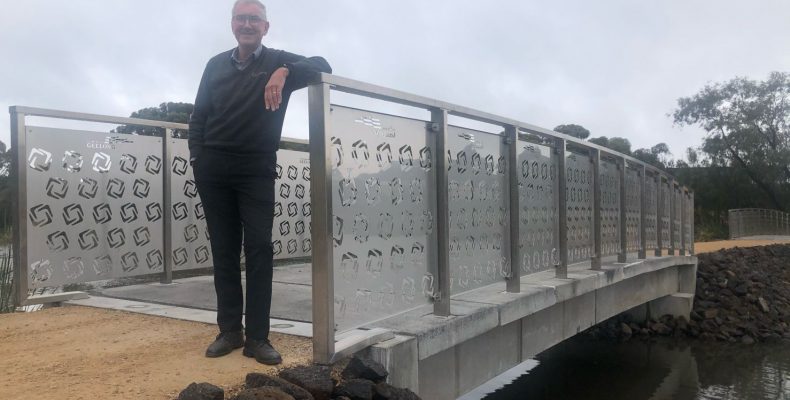The wait is over for Geelong’s pedestrians, who can now enjoy a first of its kind, sustainable advanced fibre reinforced geopolymer pedestrian footbridge following a successful innovative collaboration between Advanced Fibre Cluster members.
The world-leading bridges are designed to last more than 100 years maintenance-free, with significant environmental benefits over concrete and a low energy impact. They are the product of a collaboration between the Cluster and its members Deakin University, Austeng, the City of Greater Geelong and leading supplier to the construction sector, Rocla.
“This is a perfect example of the kind of collaboration that happens as part of the Advanced Fibre Cluster,” Austeng Managing Director Ross George said. “This project brought together multiple partners and was driven by that willingness of several parties to work together in a creative way.”
The principles of construction used for the Roman Colosseum have been applied to the footbridges as part of a Geelong geopolymer project that set out to solve the multiple challenges of concrete cancer, embedded energy, lifecycle costs and the circular economy. The next phase will be to roll out more bridges throughout Australia, and to identify other products that can be re-imagined in geopolymer.
The engineering research project made global headlines when The Economist magazine featured the novel approach.
The bridge looks like a regular concrete pedestrian bridge but the geopolymer innovation meets sustainability ambitions.
The project would not have happened without the City of Greater Geelong’s procurement for innovation approach, also known as forward commitment procurement, which stimulates market demand and supply via the substantial buying power of the public sector, helping to influence markets to more sustainable options.
The forward commitment can be up to three years in the future, assuring suppliers that investment in research and development to address an unmet need will be met with a buyer at tender.
The City of Greater Geelong, with support from Cleantech Innovations Geelong, had tendered for a 100-year maintenance-free pedestrian bridge in 2017. The tender invited companies to come up with solutions to the costly maintenance problem associated with traditional bridges – usually made of timber, steel or concrete – which cost the City around $500,000 to inspect, repair, maintain and replace each year.
Deakin University civil engineering experts Kazem Ghabraie and Mahbube Subhani completed the design of the bridges using durable carbon and glass fibre reinforced polymer.
The long-chain polymer is made by mixing fly ash, a coal industry by-product, and caustic at room temperature, emitting 80 per cent less CO2 emissions than the manufacturing of conventional concrete. Cement is estimated to represent 7 per cent of the world’s CO2 emissions.
Rocla’s geopolymer product has many possible applications such as precast walls, pipes and railway sleepers – anything which is conventionally made from concrete.
Crucially, the project solves the age-old challenge of concrete cancer in steel-reinforced concrete as the carbon fibre reinforced geopolymer beams do away with the need for traditional steel reinforcement which are subject to rust, triggering expansion, cracks and weakening, limiting the lifespan of structures.
The project was partly funded by a Federal Government grant to the Advanced Fibre Cluster Geelong.
The first two bridges to be replaced with the new design were timber structures over Cowies Creek in Deppler Park (“Seagull Paddock”).
May 2021
